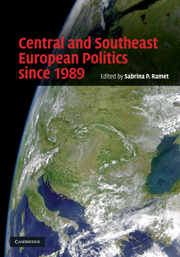Book contents
- Frontmatter
- Contents
- List of figures and maps
- List of tables
- Notes on the contributors
- Preface
- List of acronyms and abbreviations
- Guide to pronunciation of Central and Southeast European words
- 1 Central and Southeastern Europe, 1989
- 2 Central and Southeastern Europe, 2009
- Part 1 Introduction
- Part 2 Issues
- Part 3 Central Europe
- 7 Poland since 1989: muddling through, wall to wall
- 8 Building democratic values in the Czech Republic since 1989
- 9 Slovakia since 1989
- 10 Hungary since 1989
- Part 4 Yugoslav Successor States
- Part 5 Southeastern Europe
- Part 6 Former Soviet republics
- Part 7 Present and future challenges
- Index
- References
10 - Hungary since 1989
Published online by Cambridge University Press: 05 June 2012
- Frontmatter
- Contents
- List of figures and maps
- List of tables
- Notes on the contributors
- Preface
- List of acronyms and abbreviations
- Guide to pronunciation of Central and Southeast European words
- 1 Central and Southeastern Europe, 1989
- 2 Central and Southeastern Europe, 2009
- Part 1 Introduction
- Part 2 Issues
- Part 3 Central Europe
- 7 Poland since 1989: muddling through, wall to wall
- 8 Building democratic values in the Czech Republic since 1989
- 9 Slovakia since 1989
- 10 Hungary since 1989
- Part 4 Yugoslav Successor States
- Part 5 Southeastern Europe
- Part 6 Former Soviet republics
- Part 7 Present and future challenges
- Index
- References
Summary
Located in East-Central Europe, Hungary has often found itself at a crossroads of political influences of greater powers as well as of different cultures. Although Hungary enjoyed independence for centuries in its early history, the experience of foreign domination over the last five centuries is one of the defining features of Hungarian public consciousness. Most notably, Hungary was under the control of the Ottoman Empire in the sixteenth and seventeenth centuries the Habsburgs in the eighteenth, nineteenth and the beginning of the twentieth centuries and the Soviet Union from 1945 until the regime change in 1989. Therefore, Hungarians had to master the techniques of survival under foreign domination. They learned how to operate informally, under and within formal, rigid rules, which represented the interests of the dominant foreign power.
Nonetheless, during its twentieth-century history, Hungary made some genuine albeit short-lived attempts to achieve democracy. First, there was the brief liberal-democratic government of Count Mihály Károlyi in late 1918. A second attempt was made during the semi-democratic coalition government between 1945 and 1947. Finally, Hungary operated as a democracy for twelve remarkable days during the anti-totalitarian revolution of October 1956. The Hungarian revolution was internally successful but was crushed by the intervention of the Soviet Red Army. These shining moments of recent Hungarian history cannot hide the fact that throughout the twentieth century Hungary enjoyed democracy for one decade only, the 1990s.
- Type
- Chapter
- Information
- Central and Southeast European Politics since 1989 , pp. 204 - 232Publisher: Cambridge University PressPrint publication year: 2010
References
- 8
- Cited by



